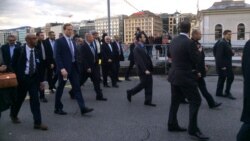It’s no surprise that working through the vast and complex issues surrounding Iran’s nuclear program would take time, especially given the trust deficit between the world and Iran, said President Barack Obama at a news conference in Washington with German Chancellor Angela Merkel.
But since the interim accord known as the Joint Plan of Action was agreed to by the negotiating parties – the EU, the P5 +1 countries and Iran -- in November 2013, “the time has been well spent,” Mr. Obama said. Serious issues have been discussed and clarified, and gaps between the two sides have been narrowed. Iran has abided by the agreement, which has not only frozen their nuclear program, but, as in the case of its supply 20 percent enriched uranium, reversed key elements.
Now the negotiations are at the point where the Iranians need to make a decision, said President Obama:
“We are presenting to them in a unified fashion – the P5 +1, supported by a coalition of countries around the world -- are presenting to them a deal that allows them to have peaceful nuclear power, but gives us the absolute assurance that is verifiable that they are not pursuing a nuclear weapon.”
Mr. Obama said he did not see a need for an extension of the nuclear negotiations. The parties have agreed to the goal of reaching a framework for a comprehensive agreement by the end of March, and completing the comprehensive agreement by the end of June:
“I don’t see a further extension being useful if they have not agreed to the basic formulation and the bottom line that the world requires to have confidence that they’re not pursuing a nuclear weapon. Now, if the framework for a deal is done, if people have a clear sense of what is required and there’s some drafting and t’s to cross and I’s to dot, that’s a different issue.”
President Obama noted the key question at this time is, “Does Iran have the political will and desire to get a deal done?”
“They should be able,” he said, “to get to yes.”






